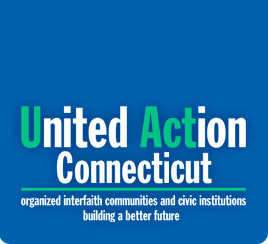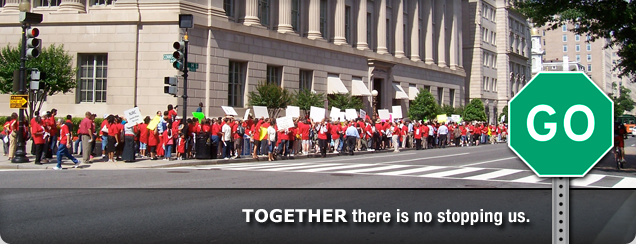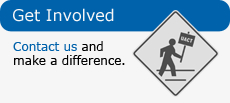United Action Connecticut
Our Mission
Strengthening communities by bringing people and congregations together to foster initiatives for improving lives through social justice work - this is the mission and purpose of United Action Connecticut. United Action is an interfaith, multi-racial, multi-lingual organization crossing political, economic and urban/suburban boundaries. We hope that you will join us in our pursuits to advance civil rights for immigrants, improve health care access, build awareness for mental illness, and to lobby for key legislation in these areas.
UACT's Issues Work for 2025
- Civil Rights for Immigrants
- Health Care Access for all
- Protections for Domestic Workers
- Mental Health Awareness
Special Session Update
Earlier this fall, 100 organizations signed a letter calling for Governor Lamont and legislative leadership to prioritize immigrant protections during the special session. Together we had 4 demands, this week we won 2 of those demands!
WHAT WE WON
-
Courthouse Protections: HB8004 codified into state law an expanded version of the courthouse protections previously announced by Chief Justice Mullins in September. The bill expanded the courthouse protections to include the wider courthouse grounds, which includes any court owned parking lot or walkways.
-
Data Protections: HB8004 put into law specific data protections so that ICE can’t get access to information that the state of Connecticut has on immigrant residents. This protection is intended to protect the personal information of immigrants who have drive-only licenses, HUSKY medicaid, or other information that the state of CT has
-
What was not included
-
Remote hearings so that people have access to virtual court hearings and don’t have to go to court
-
Protection of the current HUSKY 4 Immigrants program and healthcare access for the immigrants that will be losing their healthcare
-
Prohibiting the use of state or local resources from being used for immigration enforcement, for example usage of the CT National Guard
Trust Act Update
On Tuesday, April 8th, the Judiciary Committee of the state legislature approved legislation aimed at protecting Connecticut immigrants from deportation at the hands of federal immigration agents. A public hearing before the Judiciary Committee on the Trust Act took place on March 19th, and several UACT members testified on its behalf. The bill, HB 7212, will now move to the full legislature for debate.
The Trust Act was first enacted in 2013 and was updated and strengthened in 2019, and new provisions are being added this year. State Rep. Steve Stafstrom, D-Bridgeport, co-chairman of the Judiciary committee who introduced the bill for debate, said that it’s in an “uncertain” period in U.S. history and the current version of the Trust Act is aimed at keeping state law enforcement focused on crimes committed in the state “and that our resources are not being diverted to essentially work to solve a broken federal immigration system.”
Amendments to the Trust Act include:
- Prohibiting law enforcement agencies from providing other forms of assistance, such as sharing surveillance footage or setting up traffic perimeters, to immigration authorities.
- Preventing people who have been previously convicted of a felony from being held without a warrant. It ensures that people receive information about their right not to disclose their immigration status in a language they can understand.
- Prohibiting the Connecticut National Guard from assisting with federal immigration enforcement while under state command. It also bans other states’ militias from operating in Connecticut without the Governor’s approval.
- Prohibiting ICE arrests at courthouses, including while people travel to and leave the courthouse. It also empowers judges to enforce this rule.
- Establishing a public hotline for reporting violations of the Act, managed by the Attorney General and a new oversight committee. It also grants individuals the right to sue for violations of the Act.
Trust Act Rally
Supporters rallied in support of Connecticut immigrants at Hartford City Hall on Monday, March 3rd before marching to the State Capitol for an event advocating for the expansion of the Trust Act
.
The Trust Act, originally passed in 2013 and updated in 2019, is a state immigration law that restricts when and how local and state law enforcement can cooperate with U.S. Immigration and Customs Enforcement (ICE).
The act was put in place to protect communities from being funneled into deportation systems, according to Tabitha Sookdeo, executive director of Connecticut Students for a Dream.
Students for a Dream and the American Civil Liberties Union of Connecticut have been working with the state legislature’s Judiciary Committee on a bill, which Sookdeo said could be introduced at any moment. The bill will likely include data protection provisions and propose expanding the Trust Act’s applicability beyond law enforcement to all state agencies and staff members, Sookdeo said.
State Rep. Antonio Felipe, D-Bridgeport, vice-chair of the Black and Puerto Rican Caucus, said the Trust Act is meant to ensure that all people living in Connecticut are treated with dignity and respect. “I don’t think of this at all as us fighting against the system”, Felipe said. “It’s we’re doing what we’re supposed to do for all taxpayers.”
Hundreds participated in the rally and march from Hartford City Hall to the Capitol, including representatives of United Action CT. Patricia Rosas, who was at the rally said, “In Connecticut, immigrant communities are increasingly living in fear due to recent ICE arrests targeting undocumented individuals. These actions are tearing apart families and instilling anxiety in everyday life, preventing people from going to school, accessing healthcare, or participating in religious activities”.
HUSKY 4 Immigrant Campaign Update
On Friday, February 28, the Appropriations Committee of the state legislature, held a public hearing to hear testimony on the state budget for fiscal years 26 and 27. The HUSKY 4 Immigrant campaign was working full force before the hearing with testimony writing workshops, calling volunteers and processing outreach materials. Over one hundred written testimonies were submitted to the committee and over 60 people testified for the HUSKY campaign in person or on Zoom at the public hearing, which lasted from 10:00 am until midnight.
The campaign is looking to include HUSKY expansion for immigrants up to age 26 in the state budget. The campaign also had community members testify before the Black & Puerto Rican Caucus forum on March 3rd and are asking organizations to testify to the same caucus on Monday, March 10th. UACT will inform its members of the next steps in the campaign as they happen.
It was also announced that Katherine “Kati” Villeda has joined the HUSKY 4 Immigrant coalition as the new Coalition Director, beginning on February 24th. Kati brings a deep commitment to health equity and years of experience in policy analysis, grassroots organizing, and coalition-building. Most recently, she served as Director of Policy and Advocacy at Health Equity Solutions, where she worked closely with HUSKY 4 Immigrants as part of the advocacy and research committees.
UACT wishes Kati well in her new role and looks forward to working with her to see a successful HUSKY expansion campaign.
HUSKY 4 Immigrant Campaign
On Tuesday, January 28th, the HUSKY 4 Immigrant campaign had an exciting campaign launch at the State Capitol. At the campaign launch press conference, in the Capitol rotunda, there were powerful stories from community members, parents, young people, and legislators – all united in the fight to expand HUSKY for all Connecticut residents, regardless of immigration status.
52% of the roughly 120,000 undocumented immigrants in Connecticut do not have health insurance coverage. Most undocumented immigrants are excluded from Medicaid and CHIP programs (HUSKY Health in CT), Medicare, and Access Health CT (the state exchange of the ACA, also known as Obamacare). “Legally present” immigrants in the U.S. less than 5 years are also barred from HUSKY Health programs.
Past campaigns have won HUSKY coverage for some immigrant individuals.
- Undocumented pregnant women now have access to prenatal care and access to one year of postpartum care through HUSKY Health
- Undocumented children ages 0-15 now have access to HUSKY Health coverage.
United Action CT contends that healthcare is a human right, and every member of our community should have the dignity of access to healthcare. There is money to provide healthcare coverage to the most vulnerable in our community. Connecticut currently has a $4 billion surplus and expanding HUKY coverage for immigrants up to age 26 would account for roughly 1% of Connecticut’s state Medicaid budget and cover about 5,000 young people who are currently living without access to health insurance
The next step of the campaign is to fight for a public hearing and for the bills to pass the Human Services Committee. This legislative session there are two bills introduced into the Human Services Committee that would expand access to HUSKY for more of our immigrant community.
- HB-5430, which would expand access to immigrant young people up to the age of 26
- HB-5471, which would expand access to folks up to the age of 26, as well as 65 and over
You can help with the campaign by contacting your legislators and asking them to support the two bills on HUSKY expansion. You can also plan on testifying at the public hearing before the Human Services committee, which will probably occur sometime in February. Please stay tuned, UACT will continue to send updates on the campaign as they occur.
Grant update
The month of December was an extremely beneficial one to UACT financially. Our organization received three grant awards during December which will greatly bolster our ability to work on key social justice programs.
The Office of Catholic Social Justice Ministry (OCSJM) of the Archdiocese of Hartford gave UACT an $8,000 grant through the Catholic Campaign for Human Development. This grant is to fund UACT’s mental health and organizing projects. We are grateful to the OCSJM and Interim Director Arturo Iriarte for this award, which is an extension of the project that was started in 2023 with the help of UACT Board member Karen Dworski. The previous funding has enabled many people in the New Britain area to find multiple ways to cope with the daily stress in their lives as well as a safe space to discuss and find support for the many challenges in their daily lives. The new grant will expand the project to include speakers and resources to help with finances, housing, education and civil rights.
The Connecticut Health Foundation awarded UACT $10,000 to work on the HUSKY 4 Immigrant campaign. The H4I campaign is designed to expand the state’s Medicaid program (HUSKY) to include the immigrant community in Connecticut. These funds will allow UACT to help people write and fine tune their public hearing testimonies, reach out to communities that need health coverage but are not aware of the campaign and allow the opportunity to lobby with key legislators. We thank the foundation for their trust in UACT to help the immigrant community obtain basic health care through the HUSKY program.
The Connecticut Community Foundation awarded UACT $1,000 to specifically fund Manos Unidas, UACT’s civic organization in New Britain. The grant is part of the foundation’s Connecticut Project Matching and Discretionary Grant Fund. The Connecticut Project (TCP) brings together communities, ideas, and resources to improve systems and generate real-world outcomes for people that are lower-income or asset limited. The TCP works for a just, thriving, and optimistic Connecticut where race, gender, income, geography, and other circumstances no longer predetermine opportunity. This fits in well with the goals of UACT and Manos Unidas.






